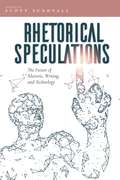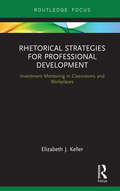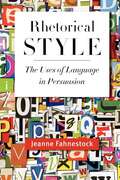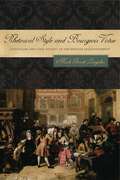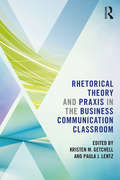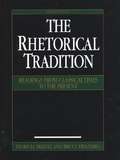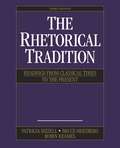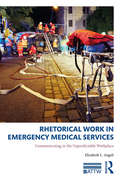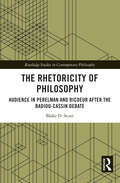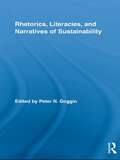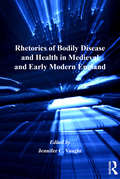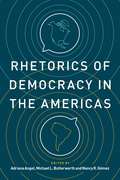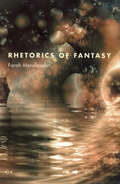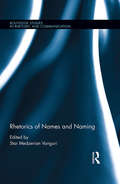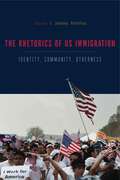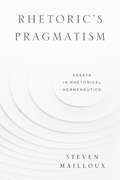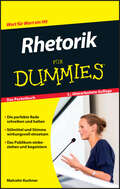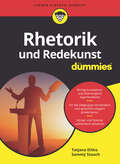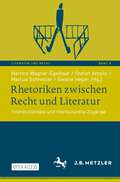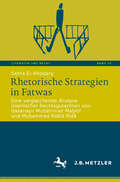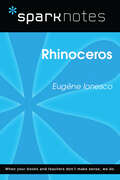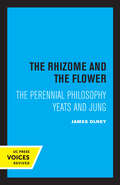- Table View
- List View
Rhetorical Speculations: The Future of Rhetoric, Writing, and Technology
by Scott SundvallThe future of writing studies is fundamentally tied to advancing technological development—writing cannot be done without a technology and different technologies mediate writing differently. In Rhetorical Speculations, contributors engage with emerging technologies of composition through “speculative modeling” as a strategy for anticipatory, futural thinking for rhetoric and writing studies. Rhetoric and writing studies often engages technological shifts reactively, after the production and reception of rhetoric and writing has changed. This collection allows rhetoric and writing scholars to explore modes of critical speculation into the transformative effect of emerging technologies, particularly as a means to speculate on future shifts in the intellectual, pedagogical, and institutional frameworks of the field. In doing so, the project repositions rhetoric and writing scholars as proprietors of our technological future to come rather than as secondary receivers, critics, and adjusters of the technological present. Major and emerging voices in the field offer a range of styles that include pragmatic, technical, and philosophical approaches to the issue of speculative rhetoric, exploring what new media/writing studies could be—theoretically, pedagogically, and institutionally—as future technologies begin to impinge on the work of writing. Rhetorical Speculations is at the cutting edge of the subject of futures thinking and will have broad appeal to scholars of rhetoric, literacy, futures studies, and material and popular culture. Contributors: Bahareh Brittany Alaei, Sarah J. Arroyo, Kristine L. Blair, Geoffrey V. Carter, Sid Dobrin, Kristie S. Fleckenstein, Steve Holmes, Kyle Jensen, Halcyon Lawrence, Alexander Monea, Sean Morey, Alex Reid, Jeff Rice, Gregory L. Ulmer, Anna Worm
Rhetorical Strategies for Professional Development: Investment Mentoring in Classrooms and Workplaces (Routledge Research in Writing Studies)
by Elizabeth J. KellerThis book extends current research and scholarship around mentoring and learning theory, illustrating how mentoring creates, enacts, and sustains multidisciplinary learning in a variety of school, work, and community contexts. In so doing, it examines the relationship between teaching and mentoring, acknowledges the rhetorical invention of mentoring, and recognizes the intersection of gender identity (as a cultural and identity signifier or marker) and mentoring. It uses mentoring as a way to reimagine value-added approaches to research and teaching practices in rhetoric and composition.
Rhetorical Style: The Uses Of Language In Persuasion
by Jeanne FahnestockA comprehensive guide to the language of argument, Rhetorical Style offers a renewed appreciation of the persuasive power of the English language. Drawing on key texts from the rhetorical tradition, as well as on newer approaches from linguistics and literary stylistics, Fahnestock demonstrates how word choice, sentence form, and passage construction can combine to create effective spoken and written arguments. With examples from political speeches, non-fiction works, and newspaper reports, Rhetorical Style surveys the arguer's options at the word, sentence, interactive, and passage levels, and illustrates the enduring usefulness of rhetorical stylistics in analyzing and constructing arguments.
Rhetorical Style and Bourgeois Virtue: Capitalism and Civil Society in the British Enlightenment (RSA Series in Transdisciplinary Rhetoric #2)
by Mark Garrett LongakerDuring the British Enlightenment, the correlation between effective communication and moral excellence was undisputed—so much so that rhetoric was taught as a means of instilling desirable values in students. In Rhetorical Style and Bourgeois Virtue, Mark Garrett Longaker explores the connections between rhetoric and ethics in the context of the history of capitalism. Longaker’s study lingers on four British intellectuals from the late seventeenth to the mid-nineteenth century: philosopher John Locke, political economist Adam Smith, rhetorical theorist Hugh Blair, and sociologist Herbert Spencer. Across one hundred and fifty years, these influential men sought to mold British students into good bourgeois citizens by teaching them the discursive habits of clarity, sincerity, moderation, and economy, all with one incontrovertible truth in mind: the free market requires virtuous participants in order to thrive. Through these four case studies—written as biographically focused yet socially attentive intellectual histories—Longaker portrays the British rhetorical tradition as beholden to the dual masters of ethics and economics, and he sheds new light on the deliberate intellectual engineering implicit in Enlightenment pedagogy.
Rhetorical Style and Bourgeois Virtue: Capitalism and Civil Society in the British Enlightenment (RSA Series in Transdisciplinary Rhetoric)
by Mark Garrett LongakerDuring the British Enlightenment, the correlation between effective communication and moral excellence was undisputed—so much so that rhetoric was taught as a means of instilling desirable values in students. In Rhetorical Style and Bourgeois Virtue, Mark Garrett Longaker explores the connections between rhetoric and ethics in the context of the history of capitalism. Longaker’s study lingers on four British intellectuals from the late seventeenth to the mid-nineteenth century: philosopher John Locke, political economist Adam Smith, rhetorical theorist Hugh Blair, and sociologist Herbert Spencer. Across one hundred and fifty years, these influential men sought to mold British students into good bourgeois citizens by teaching them the discursive habits of clarity, sincerity, moderation, and economy, all with one incontrovertible truth in mind: the free market requires virtuous participants in order to thrive. Through these four case studies—written as biographically focused yet socially attentive intellectual histories—Longaker portrays the British rhetorical tradition as beholden to the dual masters of ethics and economics, and he sheds new light on the deliberate intellectual engineering implicit in Enlightenment pedagogy.
Rhetorical Theory and Praxis in the Business Communication Classroom
by Kristen Getchell Paula LentzRhetorical Theory and Praxis in the Business Communication Classroom responds to a significant need in the emerging field of business communication as the first collection of its type to establish a connection between rhetorical theory and practice in the business communication classroom. The volume includes topics such as rhetorical grammar, genre awareness in business communication theory, the role of big data in message strategy, social media and memory, and the connection between rhetorical theory and entrepreneurship. These essays provide the business communication scholar, practitioner, and program administrator insight into the rhetorical considerations of the business communication landscape.
The Rhetorical Tradition: Readings from Classical Times to the Present (2nd Edition)
by Patricia Bizzell Bruce HerzbergThe Rhetorical Tradition — the first comprehensive anthology of primary texts covering the history of rhetoric — examines rhetorical theory from classical antiquity through the modern period. Extensive editorial material makes it an essential text for the beginning student as well as the professional scholar.
The Rhetorical Tradition: Readings From Classical Times To The Present
by Patricia Bizzell Bruce Herzberg Robin ReamesThe Rhetorical Tradition, the first comprehensive anthology of primary texts covering the history of rhetoric, examines rhetorical theory from classical antiquity through today. Extensive editorial support makes it an essential text for the beginning student as well as the professional scholar.
Rhetorical Work in Emergency Medical Services: Communicating in the Unpredictable Workplace (ATTW Series in Technical and Professional Communication)
by Elizabeth L. AngeliRhetorical Work in Emergency Medical Services: Communicating in the Unpredictable Workplace details how communicators harness the power of rhetoric to make decisions and communicate in unpredictable contexts. Grounded in a 16-month study in the emergency medical services (EMS) workplace, this text contributes to our theoretical, methodological, and practical understandings of the situation-specific processes that communicators and researchers engage in to respond to the urgencies and constraints of high-stakes workplaces. This book presents these intricate processes and skills—learned and innate—that workplace communicators use to accomplish goal-directed activity, collaborate with other communicators, and complete and teach workplace writing.
The Rhetoricity of Philosophy: Audience in Perelman and Ricoeur after the Badiou-Cassin Debate (Routledge Studies in Contemporary Philosophy)
by Blake D. ScottThis book aims to recast the way that philosophers understand rhetoric. Rather than follow most philosophers in conceiving rhetoric as a specific way of speaking or writing, it shows that rhetoric is better understood as a dimension of all human discourse and action—what the author calls “rhetoricity”.This book provides the first philosophical treatment of rhetoricity. It is motivated by two ongoing developments. The first is the debate between Alain Badiou and Barbara Cassin about philosophy’s relation to rhetoric. Both Badiou and Cassin are critical of rhetoric, albeit for different reasons. Second, there has been a growing resurgence of interest in rhetoric considering the recent rise in authoritarian politics as well as new forms of propaganda driven by “persuasive technologies”. This book identifies the common target of Badiou’s and Cassin’s otherwise incompatible critiques: rhetoric’s conception of audience. It offers a fresh take on the “new rhetoric” project of Chaïm Perelman and Lucie Olbrechts-Tyteca, putting their work into conversation with the Badiou-Cassin debate. The book then turns to the hermeneutic philosophy of Paul Ricoeur in search of an expanded conception of audience. It shows that Ricoeur’s hermeneutic philosophy allows us to extend Perelman and Olbrechts-Tyteca’s psychological notion of audience to texts themselves and to argue that human beings have a rhetorical capacity to reflect on audiences in search of what is potentially persuasive.The Rhetoricity of Philosophy will be of interest to scholars and advanced students working in contemporary European philosophy, rhetoric, argumentation studies, and social theory.
Rhetorics, Literacies, and Narratives of Sustainability (Routledge Studies in Rhetoric and Communication)
by Peter N. GogginIn this volume, rhetoricians, literacy scholars, and humanists have come together to examine the complex discursive constructions of sustainability. Touching on topics including conservation efforts in specific locales; social and political constructions of rhetorical place and space; community literacy; historical and archival analysis of institutional politics, policies, and practices concerning the environment and economic growth and development; town planning and zoning issues; and rhetorics of environmental remediation and sustainability, this collection of essays provides rhetoricians and environmentalists a window into the complex and often contradictory arena of discourse on sustainability.
Rhetorics of Bodily Disease and Health in Medieval and Early Modern England
by Jennifer C. VaughtSusan Sontag in Illness as Metaphor and AIDS and Its Metaphors points to the vital connection between metaphors and bodily illnesses, though her analyses deal mainly with modern literary works. This collection of essays examines the vast extent to which rhetorical figures related to sickness and health-metaphor, simile, pun, analogy, symbol, personification, allegory, oxymoron, and metonymy-inform medieval and early modern literature, religion, science, and medicine in England and its surrounding European context. In keeping with the critical trend over the past decade to foreground the matter of the body and the emotions, these essays track the development of sustained, nuanced rhetorics of bodily disease and health ” physical, emotional, and spiritual. The contributors to this collection approach their intriguing subjects from a wide range of timely, theoretical, and interdisciplinary perspectives, including the philosophy of language, semiotics, and linguistics; ecology; women's and gender studies; religion; and the history of medicine. The essays focus on works by Dante, Chaucer, Spenser, Shakespeare, Donne, and Milton among others; the genres of epic, lyric, satire, drama, and the sermon; and cultural history artifacts such as medieval anatomies, the arithmetic of plague bills of mortality, meteorology, and medical guides for healthy regimens.
Rhetorics of Democracy in the Americas (Rhetoric and Democratic Deliberation)
by Adriana Angel Michael L. Butterworth Nancy R. GómezDemocracy is venerated in US political culture, in part because it is our democracy. As a result, we assume that the government and institutions of the United States represent the true and right form of democracy, needed by all. This volume challenges this commonplace belief by putting US politics in the context of the Americas more broadly. Seeking to cultivate conversations among and between the hemispheres, this collection examines local political rhetorics across the Americas. The contributors—scholars of communication from both North and South America—recognize democratic ideals as irreducible to a single national perspective and reflect on the ways social minorities in the Western Hemisphere engage in unique political discourses. Essays consider current rhetorics in the United States on American exceptionalism, immigration, citizenship, and land rights alongside current cultural and political events in Latin America, such as corruption in Guatemala, women’s activism in Ciudad Juárez, representation in Venezuela, and media bias in Brazil. Through a survey of these rhetorics, this volume provides a broad analysis of democracy. It highlights institutional and cultural differences in the Americas and presents a hemispheric democracy that is both more pluralistic and more agonistic than what is believed about the system in the United States.In addition to the editors, the contributors include José Cortez, Linsay M. Cramer, Pamela Flores, Alberto González, Amy N. Heuman, Christa J. Olson, Carlos Piovezani, Clara Eugenia Rojas Blanco, Abraham Romney, René Agustín de los Santos, and Alejandra Vitale.
Rhetorics of Democracy in the Americas (Rhetoric and Democratic Deliberation #25)
by Michael L. Butterworth Adriana Angel Nancy R. GómezDemocracy is venerated in US political culture, in part because it is our democracy. As a result, we assume that the government and institutions of the United States represent the true and right form of democracy, needed by all. This volume challenges this commonplace belief by putting US politics in the context of the Americas more broadly. Seeking to cultivate conversations among and between the hemispheres, this collection examines local political rhetorics across the Americas. The contributors—scholars of communication from both North and South America—recognize democratic ideals as irreducible to a single national perspective and reflect on the ways social minorities in the Western Hemisphere engage in unique political discourses. Essays consider current rhetorics in the United States on American exceptionalism, immigration, citizenship, and land rights alongside current cultural and political events in Latin America, such as corruption in Guatemala, women’s activism in Ciudad Juárez, representation in Venezuela, and media bias in Brazil. Through a survey of these rhetorics, this volume provides a broad analysis of democracy. It highlights institutional and cultural differences in the Americas and presents a hemispheric democracy that is both more pluralistic and more agonistic than what is believed about the system in the United States.In addition to the editors, the contributors include José Cortez, Linsay M. Cramer, Pamela Flores, Alberto González, Amy N. Heuman, Christa J. Olson, Carlos Piovezani, Clara Eugenia Rojas Blanco, Abraham Romney, René Agustín de los Santos, and Alejandra Vitale.
Rhetorics of Fantasy
by Farah MendlesohnThis sweeping study of fantasy literature offers &“new and often surprising readings of works both familiar and obscure. A fine critical work&” (Journal of the Fantastic in the Arts). Transcending arguments over the definition of fantasy literature, Rhetorics of Fantasy introduces a provocative new system of classification for the genre. Drawing on nearly two hundred examples of modern fantasy, author Farah Mendlesohn identifies four categories—portal-quest, immersive, intrusion, and liminal—that arise out of the relationship of the protagonist to the fantasy world. Using these sets, Mendlesohn argues that the author's stylistic decisions are then shaped by the inescapably political demands of the category in which they choose to write. Each chapter covers at least twenty books in detail, ranging from nineteenth-century fantasy and horror to some of the best works in the contemporary field. Mendlesohn discusses works by more than one hundred authors, including Lloyd Alexander, Peter Beagle, Marion Zimmer Bradley, John Crowley, Stephen R. Donaldson, Stephen King, C. S. Lewis, Gregory Maguire, Robin McKinley, China Miéville, Suniti Namjoshi, Philip Pullman, J. K. Rowling, Sheri S. Tepper, J. R. R. Tolkien, Tad Williams, and many others.
Rhetorics of Names and Naming (Routledge Studies in Rhetoric and Communication #29)
by Star Medzerian VanguriThis volume takes up rhetorical approaches to our primarily linguistic understanding of how names work, considering how theories of materiality in rhetoric enrich conceptions of the name as word or symbol and help explain the processes of name bestowal, accumulation, loss, and theft. Contributors theorize the formation, modification, and recontexualization of names as a result of technological and cultural change, and consider the ways in which naming influences identity and affects/grants power.
The Rhetorics of US Immigration: Identity, Community, Otherness
by E. Johanna HarteliusIn the current geopolitical climate—in which unaccompanied children cross the border in record numbers, and debates on the topic swing violently from pole to pole—the subject of immigration demands innovative inquiry. In The Rhetorics of US Immigration, some of the most prominent and prolific scholars in immigration studies come together to discuss the many facets of immigration rhetoric in the United States.The Rhetorics of US Immigration provides readers with an integrated sense of the rhetorical multiplicity circulating among and about immigrants. Whereas extant literature on immigration rhetoric tends to focus on the media, this work extends the conversation to the immigrants themselves, among others. A collection whose own eclecticism highlights the complexity of the issue, The Rhetorics of US Immigration is not only a study in the language of immigration but also a frank discussion of who is doing the talking and what it means for the future.From questions of activism, authority, and citizenship to the influence of Hollywood, the LGBTQ community, and the church, The Rhetorics of US Immigration considers the myriad venues in which the American immigration question emerges—and the interpretive framework suited to account for it.Along with the editor, the contributors are Claudia Anguiano, Karma R. Chávez, Terence Check, Jay P. Childers, J. David Cisneros, Lisa M. Corrigan, D. Robert DeChaine, Anne Teresa Demo, Dina Gavrilos, Emily Ironside, Christine Jasken, Yazmin Lazcano-Pry, Michael Lechuga, and Alessandra B. Von Burg.
Rhetoric’s Pragmatism: Essays in Rhetorical Hermeneutics (RSA Series in Transdisciplinary Rhetoric #4)
by Steven MaillouxFor over thirty years, Steven Mailloux has championed and advanced the field of rhetorical hermeneutics, a historically and theoretically informed approach to textual interpretation. This volume collects fourteen of his most recent influential essays on the methodology, plus an interview.Following from the proposition that rhetorical hermeneutics uses rhetoric to practice theory by doing history, this book examines a diverse range of texts from literature, history, law, religion, and cultural studies. Through four sections, Mailloux explores the theoretical writings of Heidegger, Burke, and Rorty, among others; Jesuit educational treatises; and products of popular culture such as Azar Nafisi’s Reading Lolita in Tehran and Star Trek: The Next Generation. In doing so, he shows how rhetorical perspectives and pragmatist traditions work together as two mutually supportive modes of understanding, and he demonstrates how the combination of rhetoric and interpretation works both in theory and in practice. Theoretically, rhetorical hermeneutics can be understood as a form of neopragmatism. Practically, it focuses on the production, circulation, and reception of written and performed communication. A thought-provoking collection from a preeminent literary critic and rhetorician, Rhetoric’s Pragmatism assesses the practice and value of rhetorical hermeneutics today and the directions in which it might head. Scholars and students of rhetoric and communication studies, critical theory, literature, law, religion, and American studies will find Mailloux’s arguments enlightening and essential.
Rhetoric’s Pragmatism: Essays in Rhetorical Hermeneutics (RSA Series in Transdisciplinary Rhetoric)
by Steven MaillouxFor over thirty years, Steven Mailloux has championed and advanced the field of rhetorical hermeneutics, a historically and theoretically informed approach to textual interpretation. This volume collects fourteen of his most recent influential essays on the methodology, plus an interview.Following from the proposition that rhetorical hermeneutics uses rhetoric to practice theory by doing history, this book examines a diverse range of texts from literature, history, law, religion, and cultural studies. Through four sections, Mailloux explores the theoretical writings of Heidegger, Burke, and Rorty, among others; Jesuit educational treatises; and products of popular culture such as Azar Nafisi’s Reading Lolita in Tehran and Star Trek: The Next Generation. In doing so, he shows how rhetorical perspectives and pragmatist traditions work together as two mutually supportive modes of understanding, and he demonstrates how the combination of rhetoric and interpretation works both in theory and in practice. Theoretically, rhetorical hermeneutics can be understood as a form of neopragmatism. Practically, it focuses on the production, circulation, and reception of written and performed communication.A thought-provoking collection from a preeminent literary critic and rhetorician, Rhetoric’s Pragmatism assesses the practice and value of rhetorical hermeneutics today and the directions in which it might head. Scholars and students of rhetoric and communication studies, critical theory, literature, law, religion, and American studies will find Mailloux’s arguments enlightening and essential.
Rhetorik für Dummies (Für Dummies)
by Malcolm Kushner»Eine abgelesene Rede garantiert, dass Ihnen das Publikum nicht zuhört.« (Henry Kissinger) Sei es in Sitzungen, bei Familienfeiern oder Betriebsund Vereinsversammlungen – es gibt unzählige Anlässe, bei denen Reden üblich sind, bloß halten möchte sie keiner. Malcolm Kushner hilft Ihnen, bei Ihrem nächsten Auftritt rhetorisch zu glänzen. Er zeigt Ihnen, wie Sie Ihre Rede aufbauen, den Inhalt interessant gestalten und Satzbau und Wortwahl richtig treffen. Außerdem lernen Sie, wie Sie mit rhetorischen Stilmitteln und sprachlichen Raffinessen spielend leicht umgehen. So reißen Sie Ihr Publikum mit.
Rhetorik und Redekunst für Dummies (Für Dummies)
by Tatjana Ditko Sammy StauchMöchten auch Sie bei Ihrer nächsten Rede oder Präsentation authentisch vortragen, überzeugend argumentieren, rhetorisch geschickt formulieren und das Publikum begeistern? Dieses Buch beweist, dass auch Sie das können. Erfahren Sie, wie Sie Ihre Rede geschickt konzipieren und mit überzeugenden Argumenten und gut gewählten Worten punkten. Lernen Sie, entspannt vor Ihrem Publikum zu stehen und auch auf Zwischenfragen souverän reagieren zu können. Lassen Sie sich Tipps und Kniffe zeigen, wie Sie sich gut vorbereiten und beim Vortrag ganz präsent sind.
Rhetoriken zwischen Recht und Literatur: Interdisziplinäre und interkulturelle Zugänge (Literatur und Recht #9)
by Martina Wagner-Egelhaaf Stefan Arnold Marcus Schnetter Gesine HegerDie Beiträge dieses Open-Access-Buchs diskutieren das Verständnis von Rhetorik, mit dem heute in Literatur- und Rechtswissenschaft gearbeitet wird. Sie beleuchten, inwiefern sich die westliche Tradition von rhetorischen Perspektiven aus anderen Sprach-, Kultur- und Rechtsräumen unterscheidet. Während die Rhetorik in antiker Tradition in der Literaturtheorie nach wie vor eine große Rolle spielt, hat sie ihren Status als Leitdisziplin in den Rechtswissenschaften eingebüßt und ist lediglich für Teilbereiche wie Argumentationstheorie und Rechtslogik relevant. Der Band nimmt Recht und Literatur in ihrer gemeinsamen sprachlichen Konstitution ernst und fragt nicht zuletzt nach einem geteilten Grundverständnis von Rhetorik.
Rhetorische Strategien in Fatwas: Eine vergleichende Analyse islamischer Rechtsgutachten von Ḥasanayn Muḥammad Maḫlūf und Muḥammad Rašīd Riḍā (Literatur und Recht #14)
by Sehra El-KhodaryDieses Buch untersucht, wie islamische Rechtsgelehrte im 20. Jahrhundert in ihren Rechtsgutachten (Fatwas) rhetorisch Autorität generieren und wie sich Traditionalismus und Reformdenken in den Argumentationsmustern, der Intertextualität sowie im Duktus dieser Texte niederschlagen. Damit bietet dieses Buch einen interdisziplinären Zugang zu islamischen Rechtstexten, deren sprachliche Realisierung bisher nur wenig Aufmerksamkeit erhalten hat. Dies, obwohl eine Auseinandersetzung mit der Rhetorik rechtlicher Praxis vertiefte Einblicke in diese sowie in die Konstitutionsbedingungen der Rechtstexte verspricht, ausgehend von dem Grundgedanken der „Recht und Literatur“-Forschung, dass Recht schließlich immer über Sprache kommuniziert wird. Der erste Teil des Buches bietet einen umfassenden Überblick über die Genese des breit gefächerten Genres der Fatwa und des Muftitums bis zur Moderne, wobei Ägypten im Fokus steht. Anschließend werden zwei exemplarisch ausgewählte Fatwas zur Thematik Fotografie/Bildwerke des Reformers Muḥammad Rašīd Riḍā (1865–1935) und des Traditionalisten Ḥasanayn Muḥammad Maḫlūf (1890–1990) im Lichte sowohl gesellschaftlicher Umbrüche des frühen 20. Jahrhunderts als auch des andauernden innerislamischen Diskurses um taqlīd und iǧtihād, ein Diskurs um Geltung, Kompetenz und Autorität, auf mehreren Ebenen detailliert analysiert.
Rhinoceros (SparkNotes Literature Guide Series)
by SparkNotesRhinoceros (SparkNotes Literature Guide) by Eugene Ionesco Making the reading experience fun! Created by Harvard students for students everywhere, SparkNotes is a new breed of study guide: smarter, better, faster.Geared to what today's students need to know, SparkNotes provides:*Chapter-by-chapter analysis *Explanations of key themes, motifs, and symbols *A review quiz and essay topicsLively and accessible, these guides are perfect for late-night studying and writing papers
The Rhizome and the Flower: The Perennial Philosophy—Yeats and Jung
by James OlneyThis title is part of UC Press's Voices Revived program, which commemorates University of California Press’s mission to seek out and cultivate the brightest minds and give them voice, reach, and impact. Drawing on a backlist dating to 1893, Voices Revived makes high-quality, peer-reviewed scholarship accessible once again using print-on-demand technology. This title was originally published in 1980.
